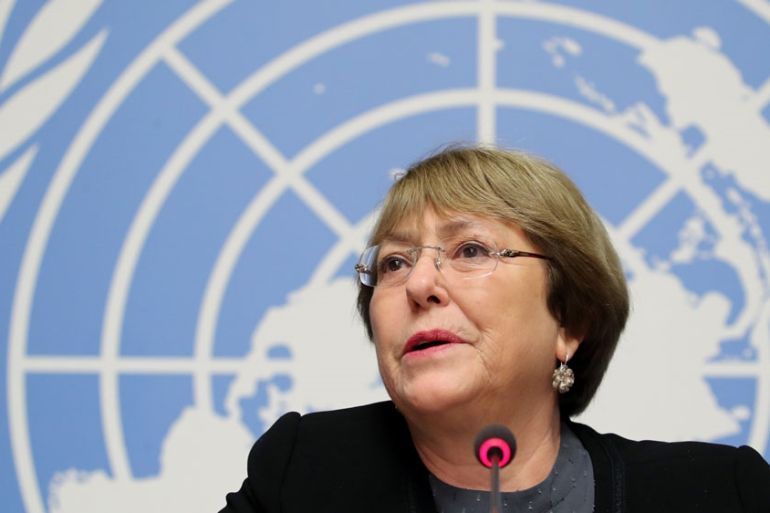Curb ‘dangerous’ hate speech, Guinea candidates told before vote
UN officials warn of ‘extremely dangerous’ situation, decry ‘increasingly pervasive and divisive appeals to ethnic affiliations’ before October 18 polls.

Less than two weeks before Guinea’s tense presidential election, the United Nations has expressed alarm at ethnically charged hate speech rising in the lead-up to the polls, warning the situation is “extremely dangerous” and may lead to violence.
In a joint statement on Wednesday, the UN rights chief Michelle Bachelet and Pramila Patten, the world body’s acting special adviser on the prevention of genocide, decried the “increasingly pervasive and divisive appeals to ethnic affiliations” before the October 18 vote.
They also urged the candidates to “refrain from using provocative language that may lead to violence, discrimination and other human rights violations”.
Guinea’s politics are mostly drawn along ethnic lines.
The country’s 82-year-old President Alpha Conde, who is seeking a controversial third term, is largely backed by Malinke people, while his main opponent, Cellou Dalein Diallo of the Union of Democratic Forces of Guinea (UFDG) party, is largely backed by Fulani people – although both insist that they are pluralist.
Bachelet and Patten pointed out that the candidates have made specific mention of the Malinke and Fulani ethnicities, and had suggested violence could follow the announcement of the results.
“Given the history of intercommunal violence in Guinea, I am deeply worried about such dangerous rhetoric by political leaders, which in some cases may amount to incitement to hostility, discrimination or violence,” Bachelet said.
“There are already serious indications of rising intolerance and confrontation, including among youth groups, and media outlets amplifying messages of hate,” she warned.
In their statement, Patten and Bachelet also demanded accountability for the reported use of excessive force by security forces during demonstrations over the past year.
Protests against Conde’s suspected ambition to stay in power that began in October 2019 have been severely repressed in the country of some 13 million people.
Last week, Amnesty International said in a report that at least 50 people were killed in the crackdown through July and criticised the government for failing to hold the security forces accountable.
Conde, a former opposition activist, became Guinea’s first democratically elected president in 2010 after decades of authoritarian rule in the former French colony. He won re-election five years later.
In March, he pushed a constitutional amendment that allowed him to stand again and potentially extend his rule, despite protests from the opposition.
In a speech on Saturday, Conde called on his supporters not to let themselves be provoked into violence and suggested that warnings of unrest amounted to opposition provocations.
“There will never be war in Guinea,” Conde told supporters in the capital Conakry, after explaining he thought the opposition planned to declare victory but seek refuge in an embassy, “thinking there will be a war”.
“You don’t take power with blood. You don’t take power by destroying vehicles. You don’t take power by provoking others,” the president said, urging voters not to use violence.
In an interview this week with French news outlets France 24 and RFI, Conde was asked whether he would accept the outcome of the vote.
“I am a democrat,” he replied.
“It’s extraordinary that I should be seen as an anti-democratic dictator,” Conde added. “I fought for 45 years, I was in the opposition.”
Conde also brushed aside accusations of fomenting ethnic divides.
“I have always said that the political fight is a competition, and that people should choose according to [the candidates’] platforms,” he said.